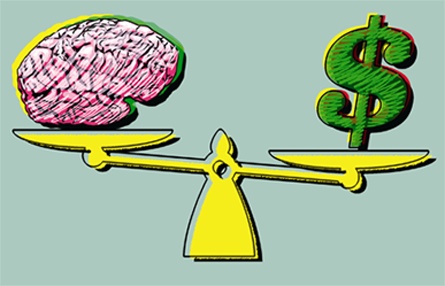 Rogue traders such as Jérôme Kerviel
Rogue traders such as Jérôme Kerviel or
Nick Leeson engage in criminal, fraudulent and high-risk financial activities that often result in huge losses ($7 billion for Kerviel) or financial catastrophe (the bankruptcy of the 233 years-old bank who employed Leeson). Why would anyone do that?
A popular answer is that money is like a drug, and that Kerviel
had behaved "like a financial drug addict" . And truly, it is. We crave money and feel its rewarding properties when our subcortical areas light up as if we were having sex or eating
Port-Royal Cupcakes (just reading the list of ingredients of the latter is enough for me!). Money hits our sweet spot, and elicits activity in emotional and emotion-related areas. Thus rogue traders are like cocaine addicts, unable to stop the never-ending search for the ultimate buzz.
This is fine, but incomplete and partly misleading. We all have temptations, drives, desires, emotions, addictions, etc., and some of us experience them more vividly. The interesting question is not how intense the money thrill is, but how weak is self-control can be. By “self-control”, I mean the vetoing capacity we have: when we resist eating fat food, smoking (oh, just one, I swear) another cigarette, insulting that person that laugh at us, flirting with that cute colleague of yours, etc. Living in society requires that we regulate our behavior and—more often than not—doing what we should do instead of what we want to do. It seems that rogue traders, like addicts and criminals, lacks a certain capacity to implement self-control and normative regulation.
Traditional accounts of self-control construe this capacity as a cognitive, rational faculty. New developments in psychology suggest that it is more like a muscle than a cognitive process. If self-control is a cognitive process, activating it should speed up further self-control since it becomes highly accessible; priming, for instance, speeds up recognition. To the contrary, if self-control is a limited resource, using it should impair or slow down further self-control (since part of the resource will be spent the first time). Many experiments support the second options: self-control and inhibitory control are limited resources, a phenomenon Roy Baumeister and his colleagues called ego depletion: the
temporary reduction in the self's capacity or willingness to engage in volitional action (including controlling the environment, controlling the self, making choices, and initiating action) caused by prior exercise of volition. (Baumeister et al., 1998, p. 1253)For instance, subjects who have to suppress their emotions while watching an upsetting movie perform worse on the Stroop task (Inzlicht & Gutsell, 2007). EEG indicates less activity in the ACC in subjects who had to inhibit their affective reactions. Subjects who had to reluctantly eat radishes abandon problem-solving earlier than subject who had chocolate willingly. Taking responsibility for and producing voluntarily a counterattitudinal speech (a speech that expresses an opinion contrary to its locutor’s) also reduced perseverance; producing the speech without taking responsibility did not) (Baumeister et al., 1998).
Self-control literally requires energy. Subjects asked to suppress facial reactions (e.g. smiles) when watching a movie have lower blood glucose levels, suggesting higher energy consumption. Control subjects (free to react how they want) had the same blood glucose levels before and after the movie, and performed better than control subjects on a Stroop Task. Restoring glucose levels with a sugar-sweetened lemonade (instead of artificially-sweetened beverages, without glucose) also increases performance. Self-control failures happen more often in situation where blood glucose levels is low. In a literature review, Gailliot et al show that lack of cognitive, behavioral and emotional control is systematically associated with hypoglycemia or hypoglycemic individuals. Thought suppression, emotional inhibition, attention control, and refraining from criminal behavior are impaired in individual with low-level blood glucose (Gailliot & Baumeister, 2007).
The bottom line is: self-control takes energy and is a limited resource; immoral actions happen not only because people are emotionally driven toward certain rewards, but because, for one reason or another, their “mental brakes” cannot stop their drives. Knowing that, as rational agents, we should allocate wisely our self-control resources: for example, by not putting ourselves in situations where we will have to spend our self-control without a good (in a utility-maximizing or moral sense) return on investment.
References- Baumeister, R. F., Bratslavsky, E., Muraven, M., & Tice, D. M. (1998). Ego Depletion: Is the Active Self a Limited Resource? Journal of Personality and Social Psychology, 74(5), 1252-1265.
- Gailliot, M. T., & Baumeister, R. F. (2007). The Physiology of Willpower: Linking Blood Glucose to Self-Control. Personality and Social Psychology Review, 11(4), 303-327.
- Harris, S., Sheth, S. A., & Cohen, M. S. (2007). Functional Neuroimaging of Belief, Disbelief, and Uncertainty. Annals of Neurology, 9999(9999), NA.
- Houde, O., & Tzourio-Mazoyer, N. (2003). Neural Foundations of Logical and Mathematical Cognition. Nature Reviews Neuroscience, 4(6), 507-514.
- Inzlicht, M., & Gutsell, J. N. (2007). Running on Empty: Neural Signals for Self-Control Failure. Psychological Science, 18(11), 933-937.
- Pessoa, L. (2008). On the Relationship between Emotion and Cognition. Nat Rev Neurosci, 9(2), 148-158.






